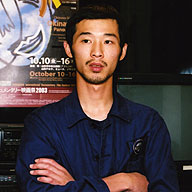An Interview with Araki Masato
The Important Thing Is to Know More
Q: It seems like a major motivation for making this piece was studying abroad in Canada.
AM: I was a policy science major in college, and it wasn’t like I was particularly interested in issues like war responsibility or education. I was a good friend with Mathis (co-director) and we even roomed together, since we were classmates at language school, and also I was interested in Germany. One day he found the website for the Memorial of the Nanjing Massacre and started a debate with me, asking how the Massacre was taught in Japan, since in Germany people learn tons about similar things like the Holocaust. When I told him it’s an issue that isn’t discussed in society, he retorted that it seemed very strange, and so we decided that the two of us would go out and try talking to a lot of people. Mathis had the idea of turning it into a documentary. Until then, it hadn’t even occurred to me to make a film. But I did some research back in Japan and started thinking this could really work, so I got a camera and returned to Canada, and then we started shooting for real.

Q: In the film, Japanese, Chinese and Korean students are having a really intense discussion.
AM: One day we happened to hear that a Chinese student was going to give a presentation on the Pacific War, so we went to get permission to shoot it. The discussion after class came together on its own. It was a school that always had a lot of Asian students, but this discussion was so lively that during the shooting I wanted to join in too. That there could be this much of a gap in knowledge and emotional intensity because of the differences in the education we’d had. I also realized for the first time the meaning of having a critical perspective on your own country’s mass media. Overall the feeling on location was that I was learning too, and we’d figure out the next step as we shot.
Q: Are there other things that left an impression?
AM: The stories of Holocaust survivors were really powerful. That they are able to talk so much about difficult things you wouldn’t even want to remember, and they have been storytellers throughout the postwar. But Mathis’ response was unusually cool. I’d intended to compare my own response to hearing Chinese people speak, contrasted against Mathis, a German, and his response to hearing stories from elderly Jews, and I envied the sensibility in Germany where people have a kind of pride that they will never repeat the same mistake twice since they have been thoroughly educated about their country’s history.
Q: What were your thoughts after you’d finished shooting the piece?
AM: At first my attitude was that we need political activism to spread the word that history isn’t properly taught in Japan. Because without education, the same mistakes will be repeated. But I myself am still wavering about what that history was all about. The testimony of survivors from the Nanjing Massacre and the Holocaust are persuasive, but I didn’t see it with my own eyes, so I can’t tell what’s really the truth when I hear arguments from various positions.
But one thing I can say is that when people of the same age go abroad, the kind of reality that I experienced might be waiting for you. When you’re discussing something, the attitude of listening to the opposite opinion and the opinions of third parties, and thinking is very important. Japanese people today don’t know enough about history. It’s actually really embarrassing that we can’t take part in discussions. It might be a good history or a bad history, but I think there’s a part you can be proud of through knowing both sides.
(Compiled by Sato Hiroaki)
Interviewer: Sato Hiroaki
Photography: Kato Takanobu / Video: Kato Takanobu / 2003-09-30 / in Tokyo
